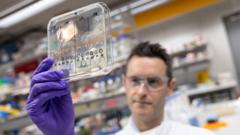Can AI Save Us from Drug-Resistant Superbugs in the UK?

Published: 2025-11-18 07:00:27 | Category: technology
The UK is launching an ambitious project leveraging artificial intelligence (AI) to combat the rise of antibiotic-resistant infections, often referred to as "superbugs." This collaboration between the Fleming Initiative and pharmaceutical giant GSK aims to accelerate the discovery of new antibiotics and develop innovative treatments against emerging threats, including serious fungal infections. With antibiotic resistance projected to become a growing crisis, the project represents a critical effort to reverse this trend and improve public health outcomes.
Last updated: 16 October 2023 (BST)
What’s happening now
In response to the escalating issue of antibiotic resistance, the UK is investing £45 million in a forward-thinking initiative that utilises AI technology to enhance antibiotic discovery. This project represents a significant pivot in the battle against superbugs, aiming to transform how researchers identify and develop new antibiotics. By focusing on challenging Gram-negative bacteria, which are notoriously difficult to treat, this collaboration seeks to streamline the research process and provide faster solutions to a growing health crisis.
Key takeaways
- The UK is investing £45 million in AI-driven antibiotic research.
- Superbugs currently kill approximately one million people annually worldwide.
- The Fleming Initiative is named after Alexander Fleming, the discoverer of penicillin.
- AI will be used to predict superbug emergence and resistance patterns.
- The project aims to tackle both bacterial and fungal infections.
Timeline: how we got here
Since the early 20th century, the emergence of antibiotics has revolutionised medicine. However, the rise of antibiotic resistance has become a critical concern. Key milestones include:
- 1928: Alexander Fleming discovers penicillin, marking the beginning of the antibiotic age.
- 1980s-1990s: The development of new antibiotics slows significantly.
- 2019: The World Health Organization (WHO) declares antibiotic resistance a global health emergency.
- 2023: The UK announces a £45 million investment in AI-driven initiatives to combat antibiotic resistance.
What’s new vs what’s known
New today/this week
The announcement of the £45 million investment in AI for antibiotic research signifies a major development in addressing antibiotic resistance. The project aims to leverage AI to improve the efficiency of antibiotic discovery and anticipate bacterial resistance patterns.
What was already established
Antibiotic resistance has been recognised as a significant threat for decades, with experts warning of its potential consequences. The ongoing issue of overusing antibiotics has driven bacteria to evolve, making the development of new antibiotics a pressing need.
Impact for the UK
Consumers and households
As antibiotic resistance continues to rise, the implications for public health are severe. The inability to treat common infections could lead to increased hospitalisations and higher healthcare costs. This project aims to ensure that effective treatments remain available, thus safeguarding health services and reducing the burden on families.
Businesses and jobs
Pharmaceutical companies and research institutions stand to benefit from this initiative as it may spark innovation and job growth in the biotech sector. The collaboration between GSK and the Fleming Initiative could lead to the development of new drugs, enhancing the UK's position in global pharmaceutical markets.
Policy and regulation
The UK government's investment in this project reflects a commitment to tackling public health challenges through innovative solutions. Future policies may evolve to support more robust frameworks for antibiotic development and stewardship to ensure the sustainability of antibiotics.
Numbers that matter
- £45 million: Total investment in AI-driven antibiotic research.
- 1 million: Estimated annual deaths caused by superbugs worldwide.
- 400: New antibiotic-resistant infections detected weekly in the UK.
- 80 years: Since Fleming warned of antibiotic resistance, highlighting the urgent need for new solutions.
Definitions and jargon buster
- Antibiotic Resistance: The ability of bacteria to resist the effects of medications that once effectively treated infections.
- Gram-negative Bacteria: A group of bacteria that are resistant to many antibiotics due to their unique cell wall structure.
- AI (Artificial Intelligence): The simulation of human intelligence processes by machines, particularly computer systems, to solve complex problems.
How to think about the next steps
Near term (0–4 weeks)
In the immediate future, the focus will be on establishing research frameworks and recruiting experts to drive the initiative forward. Early data collection will also be crucial for feeding AI learning processes.
Medium term (1–6 months)
Over the next several months, researchers will begin conducting experiments and analysing results. The aim is to refine approaches to antibiotic discovery and begin developing new compounds that can bypass bacterial defences.
Signals to watch
- Progress reports on research outcomes and discoveries from the collaboration.
- Updates on the emergence of new antibiotic-resistant infections in the UK.
- Potential regulatory changes to support antibiotic development and usage.
Practical guidance
Do
- Stay informed about antibiotic resistance and its implications for health.
- Consult healthcare professionals about antibiotic use and stewardship.
- Support initiatives aimed at improving public health and antibiotic research.
Don’t
- Don’t self-prescribe antibiotics or misuse them without medical advice.
- Don’t ignore symptoms of infection; seek timely medical care.
- Don’t overlook the importance of vaccination and preventive care.
Checklist
- Understand when antibiotics are necessary and when they are not.
- Follow prescribed antibiotic courses completely.
- Practice good hygiene to help prevent infections.
- Stay up-to-date with vaccinations to reduce the risk of infection.
- Engage with community health initiatives promoting antibiotic stewardship.
Risks, caveats, and uncertainties
While the collaboration represents a significant investment in addressing antibiotic resistance, uncertainties remain. The evolving nature of bacterial resistance patterns and the potential for unforeseen challenges in developing new antibiotics are critical factors. Additionally, the long-term effectiveness of new treatments must be evaluated as they are introduced to the market.
Bottom line
The UK's initiative to utilise AI in the fight against antibiotic-resistant infections marks a pivotal moment in public health strategy. By investing in technology that promises to enhance the speed and effectiveness of antibiotic discovery, the project aims to safeguard future generations from the consequences of a looming health crisis.
FAQs
What is the UK's new project on antibiotic resistance?
The UK is launching a £45 million initiative that uses artificial intelligence to accelerate the discovery of new antibiotics and combat antibiotic-resistant infections.
How serious is the problem of antibiotic resistance?
Antibiotic resistance is a growing crisis, currently causing around one million deaths annually worldwide and raising concerns for public health systems.
What role does AI play in tackling superbugs?
AI will analyse data from experiments to identify how to modify antibiotics effectively, aiming to outpace bacterial evolution and develop new treatments.



